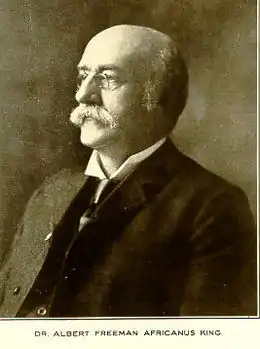Albert Freeman Africanus King
Albert Freeman Africanus King ( - décembre 1914) est un médecin, professeur d'obstétrique américain, d'origine britannique, qui fut l'un des premiers à suggérer une relation entre moustiques et malaria. Il fut aussi l'un des premiers médecins à porter secours au président Abraham Lincoln, après que John Wilkes Booth ait tiré sur lui le dans le théâtre Ford à Washington, D.C..

| Naissance | Ambrosden (en) |
|---|---|
| Décès |
(à 73 ans) Washington |
| Sépulture |
Cimetière Rock Creek (en) |
| Nationalité | |
| Formation |
Université George-Washington George Washington University Medical School (en) |
| Activités |
| A travaillé pour |
Hôpital Lincoln (Bronx) (en) |
|---|
Jeunesse et études
Albert naît à Bicester, un village du Oxfordshire en Angleterre. Il est le fils d'Edward K. King[1], un médecin qui se passionne pour le continent africain. Passion à laquelle son fils doit son troisième prénom : « Africanus »[2]. Albert n'est âgé que de dix ans lorsque sa famille émigre aux États-Unis. Il étudie la médecine au Columbia Medical College puis à l'Université de Pennsylvanie, où il obtient son diplôme en 1865, à l'âge de 24 ans.
Malaria
Le , King présente à la Philosophical Society de Washington, D.C. son intuition quant à la malaria qui sévit dans la capitale américaine. Dans son exposé, il indique que la malaria « peut s'expliquer, par la supposition que le moustique est la véritable source de la maladie, plutôt que par l'inhalation ou l'absorption par voie cutanée de la vapeur des marais. »[3],[4] (Le nom de la maladie vient de l'italien malaria qui signifie « mauvais air ».) King communique son intuition six ans avant que le médecin français Charles Louis Alphonse Laveran, qui travaille alors en Algérie identifie le parasite responsable de la maladie et plus de dix ans avant que le britannique Ronald Ross ne confirme la transmission de la malaria par les moustiques.
Si l'intuition de King est la bonne, la solution qu'il propose ensuite à son auditoire prête plutôt à sourire, puisqu'il préconise, ni plus ni moins de recouvrir Washington sous une moustiquaire géante. On ignore toujours, à ce jour, si cette proposition était sérieuse ou faite simplement sous forme d'une boutade pour amuser son auditoire. Il n'en est pas moins vrai que personne ne prit au sérieux l'intuition de King et qu'aucune recherche ne fut entreprise en ce sens.
Œuvres
- A manual of obstetrics, Philadelphia : Henry C. Lea's Son & Co., 1882. (OCLC 14789263)
- Dystocia from short or coiled funis, and its treatment, Chicago : Office of the American Medical Association, 1887. (OCLC 70663784)
- A new explanation of the renal troubles, eclampsia, and other pathological phenomena of pregnancy and labor, New York : William Wood and Company, 1887. (OCLC 65360930)
- The physiological argument in obstetric studies and practice, New York : William Wood & Co., 1888. (OCLC 70328048)
- The natural rectification of malpresentations, and its imitation by art, New York : William Wood & Co., 1889. (OCLC 300397072)
- Hysteria, New York : William Wood & Co., 1891. (OCLC 70713487)
- The fluorescence of quinine and other remedies in the cure of malarial fever, Philadelphia? : s.n., 1902. (OCLC 233260739)
- On functional reversion and its import in medical practice,Philadelphia : J.B. Lippincott Co., 1903. (OCLC 300397078)
- What is a living animal? How much of it is alive? Lancaster, Pa. 1909. (OCLC 24631866)
- Another hypothesis as to the origin and prevention of cancer, City of Washington : Beresford, printer, 1913. (OCLC 226949774)
- Cancer of the testicle, West Palm Beach? : s.n., 1914. (OCLC 244264562)
Notes et références
- Major, p. 103.
- Kunhardt. Twenty Days, p. 45
- Citation originale : I now propose a series of facts … with regard to the so called "malarial-poison" and to show how they may be explicable by the supposition that the mosquito is the real source of the disease rather than the inhalation or cutaneous absorption of a marsh vapor.
- Huth, p. 200.
Bibliographie
- Charles M. Poser et G. W. Bruyn, An Illustrated History of Malaria, Informa Health Care, 1999. (ISBN 978-1-85070-068-5)
- Edward J. Huth et T. J. Murray, Medicine in Quotations: Views of Health and Disease Through the Ages, ACP Press, 2006. (ISBN 978-1-930513-67-9)
- Dorothy Kunhardt et Phillip B. Kunhardt Jr., Twenty Days: A Narrative in Text and Pictures of the Assassination of Abraham Lincoln and the Twenty Days and Nights That Followed. New York: Castle Books, 1965.
- Ralph Hermon Major, Classic descriptions of disease with biographical sketches of the authors. Oxford: Blackwell, 1945. (OCLC 28654222)
Liens externes
- Portail de la médecine
- Portail des États-Unis